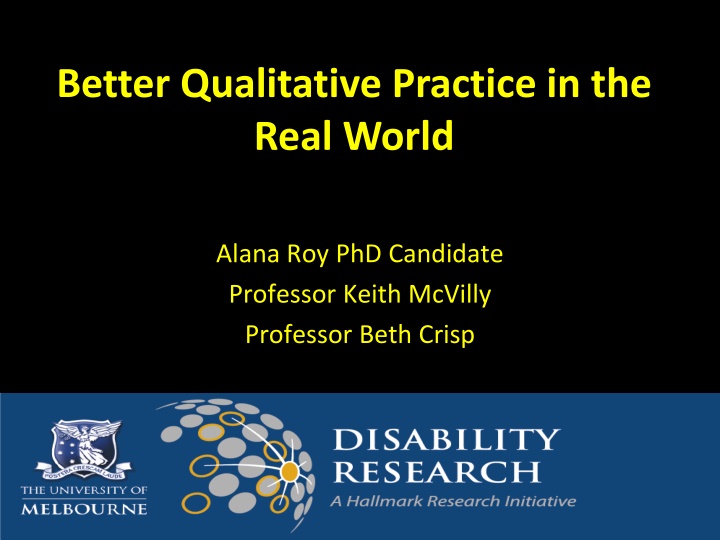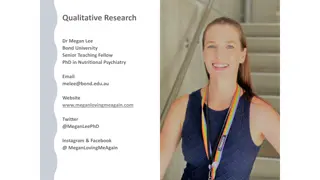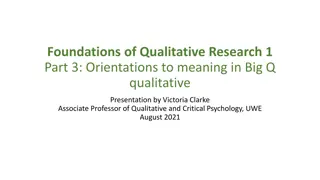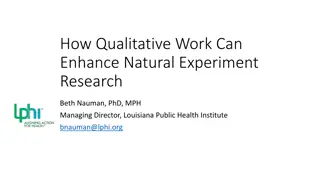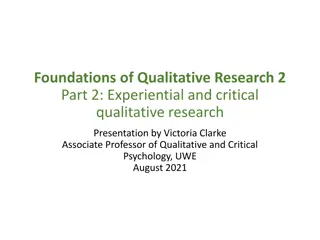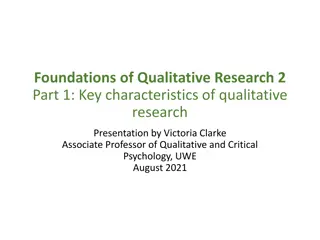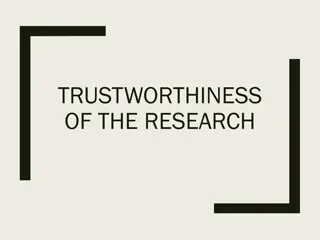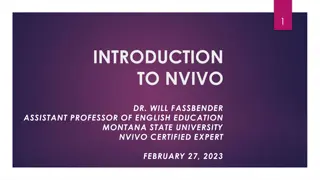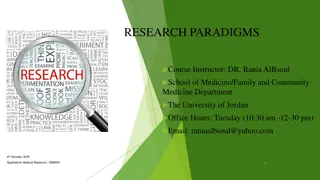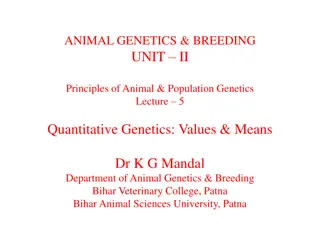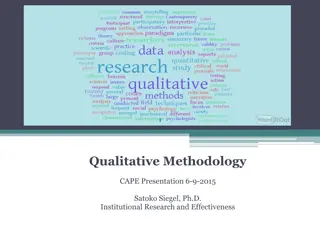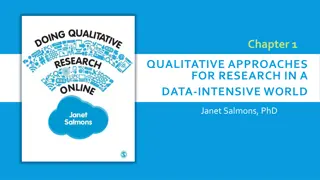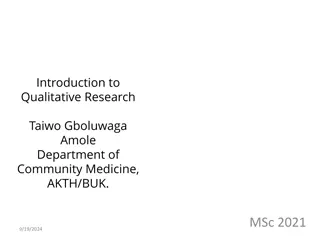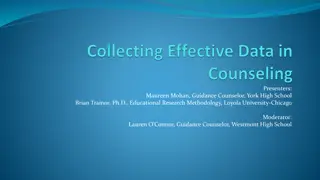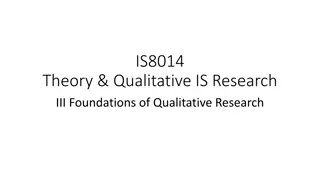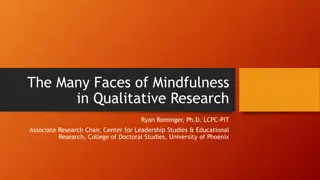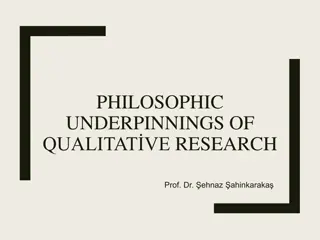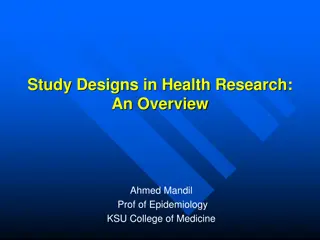Better Qualitative Practice in the Real World: Research and Development Studies
This content delves into research on better qualitative practice in the real world, focusing on Deafblind individuals and professionals. It explores topics such as preparing for inclusive consultation, developing good practice frameworks, and navigating research processes involving diverse communication needs. Through studies and publications by Alana Roy, Keith McVilly, and Beth Crisp, valuable insights are shared to enhance understanding and support in this area.
Download Presentation

Please find below an Image/Link to download the presentation.
The content on the website is provided AS IS for your information and personal use only. It may not be sold, licensed, or shared on other websites without obtaining consent from the author.If you encounter any issues during the download, it is possible that the publisher has removed the file from their server.
You are allowed to download the files provided on this website for personal or commercial use, subject to the condition that they are used lawfully. All files are the property of their respective owners.
The content on the website is provided AS IS for your information and personal use only. It may not be sold, licensed, or shared on other websites without obtaining consent from the author.
E N D
Presentation Transcript
Better Qualitative Practice in the Real World Alana Roy PhD Candidate Professor Keith McVilly Professor Beth Crisp
The Research Questions 1) What is current accepted practice in arranging events for, and consulting with DB 2) How best can sign language interpreters be prepared for consultation and research activities with DB and World cafe. 3) What knowledge, skills, tools and resources are needed when planning a World Caf consultation for DB
Studies DB and the professionals participated in research and development of a good practice framework by evaluating the research process. Study 1) Preparing for inclusive consultation, research and policy development -insights from the field of DB (Elite interviews N= 8) Study 2) Working with DB people to develop a good practice approach to consultation and research activities (World Caf N= 15)
Studies Study 3) Creating a more inclusive world - lessons from professionals in the field of DB; and Study (World Caf N=15). Study 4) Navigating research, policy and consultation processes involving people with diverse communication and support needs - insights from DB sign language interpreters (survey N=11).
Publications Roy, A., McVillly, K. R., & Crisp, B. R. (2019). Working with Deafblind people to develop a good practice approach. Journal of Social Work. https://doi.org/10.1177/1468017319860216 Roy, A., McVillly, K. R., & Crisp, B. R. (2018). Preparing for inclusive consultation, research and policy development: insights from the field of Deafblindness. Journal of Social Inclusion. https://josi.journals.griffith.edu.au/index.phpalana /inclusion/article/view/1049
Appreciative Inquiry Imagine what it would look like if it worked What would you need for it to work? In a group am I loud or quiet? If you are loud encourage others to talk If quiet try and share your voice Everyone s perspective is important.
DB people often identify as being a culturally and linguistically diverse group and having a disability.
Study 1 : Deafblind Professionals Professionals and researchers need specialist knowledge skills and to be culturally competent. Celebrate diversity, cultural nuances and individual sensory and emotional idiosyncrasies.
Study 1: Deafblind Professionals DB require specialist communication to access context, meaning and a holistic view. Be willing to engage in mutual vulnerability and trust. trust. DB researchers need to be flexible and allow for time to develop connections.
Study 1 : Deafblind Professionals Provide a significant amount of time to allow for DB to absorb the information, unpack the meaning and then provide their own opinions. Power to the people by addressing power imbalances in current professional led and deficit and problem orientated approaches.
Study 2: Deafblind World Caf Don't focus on the disability or the deficits. You need to step into our world and culture then we can co-produce the research agenda together . Learn from the spirit of the DB community and don t try to quantify their experiences.
Study 2 Deafblind World Cafe Scaled surveys and graded responses doesn t apply for the Deafblind community, I prefer face to face discussions . Sometimes scales do not allow me to communicate my thoughts on an issue . Human interaction is important; touch and connection is important . I tend to ignore online and email interactions, I often feel very frustrated with communication break downs .
Study 3: Professionals in the Field DB need: consultation, research, policy and service development that unites and responds to the needs of diversity without requiring uniformity or fragmentation. Requires safe spaces, people and professionals who are able to navigate complex dual relationships and have the ability to transcend sight and sound barriers.
Study 3: Professionals in the Field DB research and policy agenda and subsequent solutions need to be informed by the lived experience and framed in the context of what works as opposed to what isn t working .
Study 4: Interpreters DB Interpreters may benefit from preparation for consultation, research, policy and service development context by utilising a multimodal approach (meetings, information packs, training, videos, consultations and debriefs).
Study 4: Interpreters Sign language interpreters should have training in research methodology and conversely, researchers working with Deafblind people should obtain sign language skills. DB people, researchers and translators could co- create research scenarios so that researchers do not need to rely solely on the interpreter s professional license to expand and unpack the meaning.
Study 4: Interpreters DB people want and benefit from engaging in mixed communication groups. Larger scale community conversations and groups can be expensive and complex to employ. However, the DB community should have access despite these challenges.
Study 4: Interpreters Multiple rounds of questions can be used at the DB World Caf . These questions should target real world issues for DB people and the professionals who support them. The questions should be driven by Appreciative Inquiry and seek to generate positive insights, action and energy in the room.
Study 4: Interpreters The questions should be in simple language and relatively short. The questions could also include examples and scenarios. The research questions should be trialled and tested on a small sample of DB people and professionals.
Study 4: Interpreters DB people and the professionals who support them should be consulted (multi disciplinary). DB people and professionals require education and training to understand theory, research methodology. Essential to have specific consultation meetings and host question and answer sessions to help set the context of the research project.
Study 4: Interpreters Qualitative linguistic research workshops: in regards to, interpreting and translating research methodology into sign language, haptics and spoken word. Share theories, skills, knowledge and insights. This collaborative process will help the DB community identify and assign specific roles, tasks and goals within the project.
Study 4: Interpreters DB people should be encouraged to hold the space for others by focusing, acknowledging diverse perspectives and looking for opportunities to agree and grow an idea. DB people should actively seek to look for what connects the Deafblind community and the collective intelligence of this culturally and linguistically diverse group.
Co-creating a more inclusive world for us all: diversity unites us We are diverse, we have a diversity of backgrounds, we are not one group with one set of needs . We need each-other in order to co-create a more inclusive and diverse society for all .
Co-creating a more inclusive world for us all When Vulnerability and trust come together: there appears to be a connection, Deafblind people and professionals can relate, instead of operating out a sense of confusion or inadequacy, there s this lovely mutuality that s there . These people are not just professionals but cultural advocates, bridges and allies .
Co-creating a more inclusive world for us all: diversity unites us I belong to the Deafblind community and it has a unique Deafblind culture . We enterthe world of DB at different times and for different reasons with varying levels of vision and hearing among the group requiring different forms and levels of support .
Deafblind Cafe Tool Kit Contact Alana for more information We inquire, we share, we learn, we create, we design, and we will implement!
Thank you! Alana Roy Psychologist/Social worker/ PhD Candidate 0416 869 823 alana@thesignsoflife.com.au
